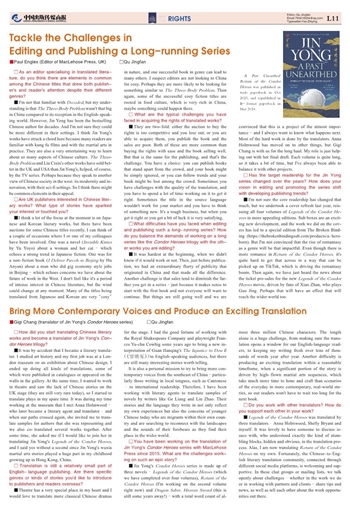■Paul Engles (Editor of MacLehose Press, UK)□Qu Jingfan
□As an editor specialising in translated literature, do you think there are elements in common among the Chinese titles that drew both publisher's and reader's attention despite their different genres?
■I'm not that familiar with Decoded, but my understanding is that The Three-Body Problem wasn't that big in China compared to its reception in the English-speaking world. However, Jin Yong has been the bestselling Chinese author for decades. And I'm not sure they could be more different in their settings. I think Jin Yong's works have struck a chord here because many readers are familiar with kung fu films and with the martial arts in practice. They are also a very entertaining way to learn about so many aspects of Chinese culture. The Three-Body Problem and Liu Cixin's other works have sold better in the UK and USA than Jin Yong's, helped, of course, by the TV series. Perhaps because they speak to another view of Chinese society in the west: its modernity and innovation, with their sci-fi settings. So I think there might be common elements in their appeal.
□Are UK publishers interested in Chinese literary works? What type of stories have sparked your interest or touched you?
■I think a lot of the focus at the moment is on Japanese and Korean literary works, but there have been auctions for some Chinese titles recently, I can think of a couple of occasions where I or one of my colleagues have been involved. One was a novel (Invisible Kitties by Yu Yoyo) about a woman and her cat–which echoes a strong trend in Japanese fiction. One was for a non-fiction book (I Deliver Parcels in Beijing by Hu Anyan) about a man who did gig economy style jobs in Beijing–which echoes concerns we have about the future of work in the West. I don't feel like it's a period of intense interest in Chinese literature, but the wind could change at any moment. Many of the titles being translated from Japanese and Korean are very “cosy” in nature, and one successful book in genre can lead to many others. I suspect editors are not looking to China for cosy. Perhaps they are more likely to be looking for something similar to The Three-Body Problem. Then again, some of the successful cosy fiction titles are rooted in food culture, which is very rich in China, maybe something could happen there.
□What are the typical challenges you have faced in acquiring the rights of translated works?
■They are two-fold: either the auction to buy the rights is too competitive and you lose out, or you are able to acquire them, you publish the book and the sales are poor. Both of these are more common than buying the rights with ease and the book selling well. But that is the same for the publishing, and that's the challenge. You have a choice: you can publish books that stand apart from the crowd, and your book might be simply ignored, or you can follow trends and your book might be lost among the crowd. Sometimes you have challenges with the quality of the translation, and you have to spend a lot of time working on it to get it right. Sometimes the title in the source language wouldn't work for your market and you have to think of something new. It's a tough business, but when you get it right or you get a bit of luck it is very satisfying.
□What difficulties have you faced when editing and publishing such a long-running series? How do you balance the demands of working on a long series like the Condor Heroes trilogy with the other works you are editing?
■It was hardest at the beginning, when we didn't know if it would work or not. Then, just before publication, we had an extraordinary flurry of publicity that originated in China and that made all the difference. Another challenge is that sales tend to diminish the further you get in a series–just because it makes sense to start with the first book and not everyone will want to continue. But things are still going well and we are convinced that this is a project of the utmost importance–and I always want to know what happens next. Most of the hard work is done by the translators. Anna Holmwood has moved on to other things, but Gigi Chang is with us for the long haul. My role is just helping out with her final draft. Each volume is quite long, so it takes a bit of time, but I've always been able to balance it with other projects.
□Has the target readership for the Jin Yong series changed over the years? How does your vision in editing and promoting the series shift with developing publishing trends?
■I'm not sure the core readership has changed that much, but we undertook a cover refresh last year, reissuing all four volumes of Legends of the Condor Heroes in more appealing editions. Sub boxes are an exciting new development, and the work we did on the covers has led to a special edition from The Broken Binding (https://thebrokenbindingsub.com/products/a-hero-born). But I'm not convinced that the rise of romantasy as a genre will be that impactful. Even though there is more romance in Return of the Condor Heroes, it's quite hard to get that across in a way that can be picked up on TikTok, which is driving the romantasy boom. Then again, we have just heard the news about the ticket pre-sales for the new Legends of the Condor Heroes movie, driven by fans of Xiao Zhan, who plays Guo Jing. Perhaps that will have an effect that will reach the wider world too.



